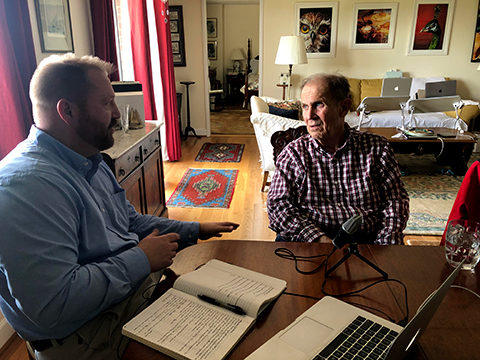BY DAN GRAZIER, Center for Defense Information, Project On Government Oversight, MAY 23, 2019
Military scholars and practitioners continue to debate the significance and merit of John Boyd’s ideas more than 20 years after his death.
Dan Grazier interviews Chuck Spinney, May 2019. (Photo: Dan Grazier)
Colonel Boyd is the legendary Air Force fighter pilot who, in addition to revolutionizing aerial combat tactics and aircraft design, also changed the way Americans think about conflict and warfare. He profoundly influenced the Marine Corps’ maneuver warfare doctrine and helped shape the ground campaign that led to the rapid defeat of the Iraqi Army during the 1991 Gulf War.
In recent years, some have attempted to classify Boyd’s ideas as airpower theory, which at its core is the basic idea that an air force, when commanded by airmen bombing targets selected by airmen, can influence the outcome of a conflict at the strategic level, independent of ground or naval forces.
Chuck Spinney, one of Boyd’s closest collaborators, explains how Boyd pointedly disagreed with airpower theory and how his ideas encompass conflict in all forms.
The Pentagon Labyrinth, a podcast by POGO's Center for Defense Information, discusses key issues and current challenges for military and Pentagon reform.
Show Notes:
Airpower for Strategic Effect – Colin Gray
“Destruction and Creation” – John Boyd
“Genghis John” – Franklin C. Spinney
The Center for Defense Information at POGO aims to secure far more effective and ethical military forces at significantly lower cost.



